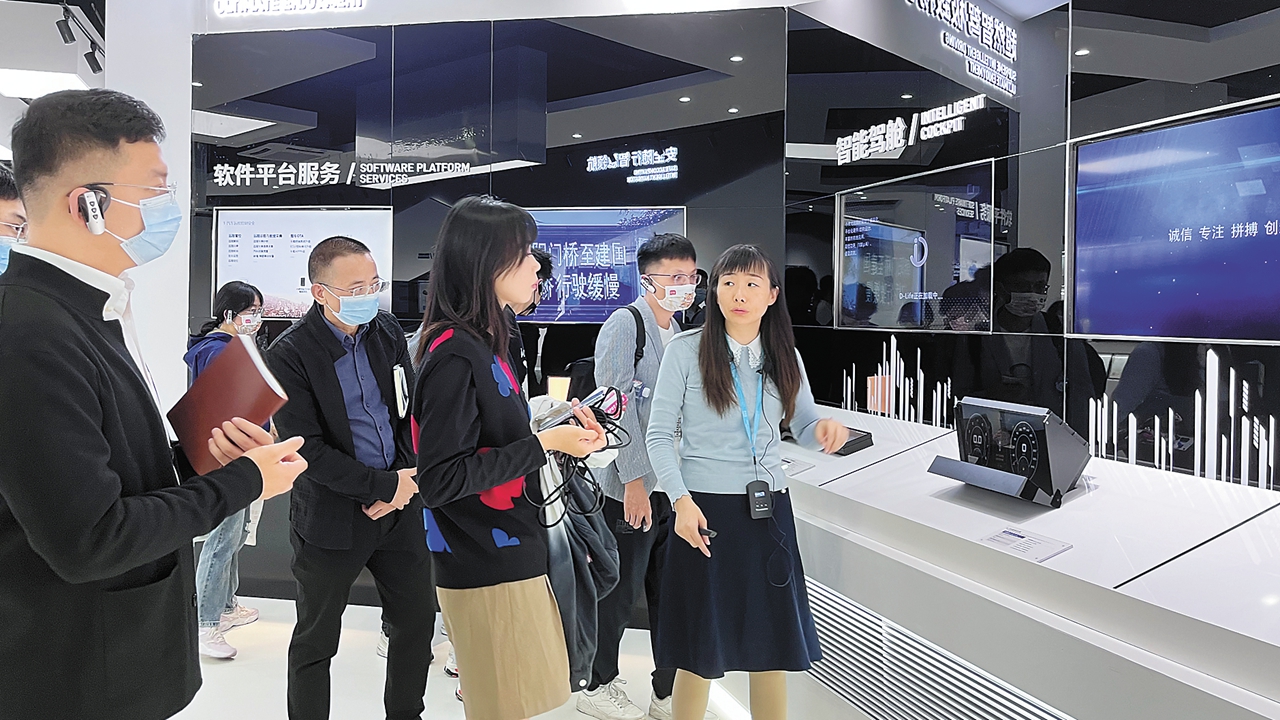HSAE doubles down on innovation for growth

Tu Lijuan (R), assistant to HSAE’s CEO and director of the strategic development department, introduces the company’s business to a group of reporters at the company’s headquarters in Bao’an District on Feb. 10. Zhang Yu
When former Premier Wen Jiabao visited Shenzhen Hangsheng Electronics Co. Ltd. (HSAE) on Nov. 4, 2008, Wen spoke highly of the company, saying that it had “gained dignity and status with innovation.”
Over the past 30 years, innovation has always been deeply rooted in HSAE’s DNA, making it a national high-tech enterprise integrating R&D, production, sales, after-sales service and logistics, and a leading enterprise in China’s automotive electronics industry.
HSAE, headquartered in Bao’an District, develops and produces products such as intelligent connected vehicle (ICV) information systems, intelligent driving assistance systems and new energy vehicle (NEV) control electronic systems for automotive enterprises.
Its strong manufacturing and R&D capabilities have been certified and recognized by renowned car manufacturers such as Volkswagen, Nissan, Toyota, Mitsubishi, Ford, Peugeot, Citroen, Honda, Hyundai and GAC Group, to name just a few.
“Scientific research really depends on one’s own efforts, and technology is not bought or exchanged,” Yang Hong, HSAE chairman and chief executive, told reporters in a recent media research tour at the company’s headquarters.
This year marks the 30th anniversary of HSAE’s establishment in Shenzhen, a city which pioneered China’s reform and opening up. Through the years, the company has strutted proudly on to the world stage, playing a crucial role in the global automotive industrial chain.
The company’s story also reflects how China’s manufacturing gained strength and earned the world’s respect.
Yang recalled that HSAE’s first 10 years was arduous and faced funding issues. Initially, the company was only a factory responsible for processing incoming materials and was an original equipment manufacturer for Philips’ stereo systems.
To address its financial difficulties, HSAE took the first step in mechanism innovation by offering shares to its employees. Its market presence gradually increased, and in 2000, the company’s sales revenue went up to 100 million yuan (US$14.52 million), standing out in the domestic car stereo system industry.
“The second decade was about independent innovation, particularly technological innovation,” Yang said.
In 2001, Yang went to Germany and visited Bosch, the world’s leading auto parts manufacturer that has long boasted expertise in automotive electronics such as engine technology, automotive chassis control system and automotive navigation.
At that time, Yang made up his mind to double down on investment in technology and make HSAE become the “Bosch” of China. Since then, R&D investment has become HSAE’s top priority. The proportion of its annual R&D investment in sales rose from 3% to 5% and then to nearly 8%.
In 2006, HSAE won the Global Innovation Award from Nissan Motors among the Japanese automaker’s over 3,000 global suppliers. In 2021, HSAE won the award again after 15 years, becoming the first and only Chinese enterprise to win this award twice so far.
According to Yang, HSAE’s third decade was about transformation and upgrading. During the period, the company has stepped up its efforts to go global and seized the opportunities brought by the popularity of NEVs and ICVs.
As early as 2010, HSAE began the R&D of NEVs’ three core pats — power battery, electric motor and motor controller, and built a team to carry out technical research.
The company’s input has resulted in fruitful achievements in the fields of intelligent cockpit systems, ICV information systems, intelligent driving systems and NEV control systems. So far, HSAE has nearly 5 billion yuan in operating revenue, and is moving toward the goal of reaching 10 billion yuan.
Looking ahead, Yang said high-quality development is the development trend of China’s manufacturing industry. Only by adhering to independent innovation can a company create continuous profits, attract high-end talents and create value for customers.